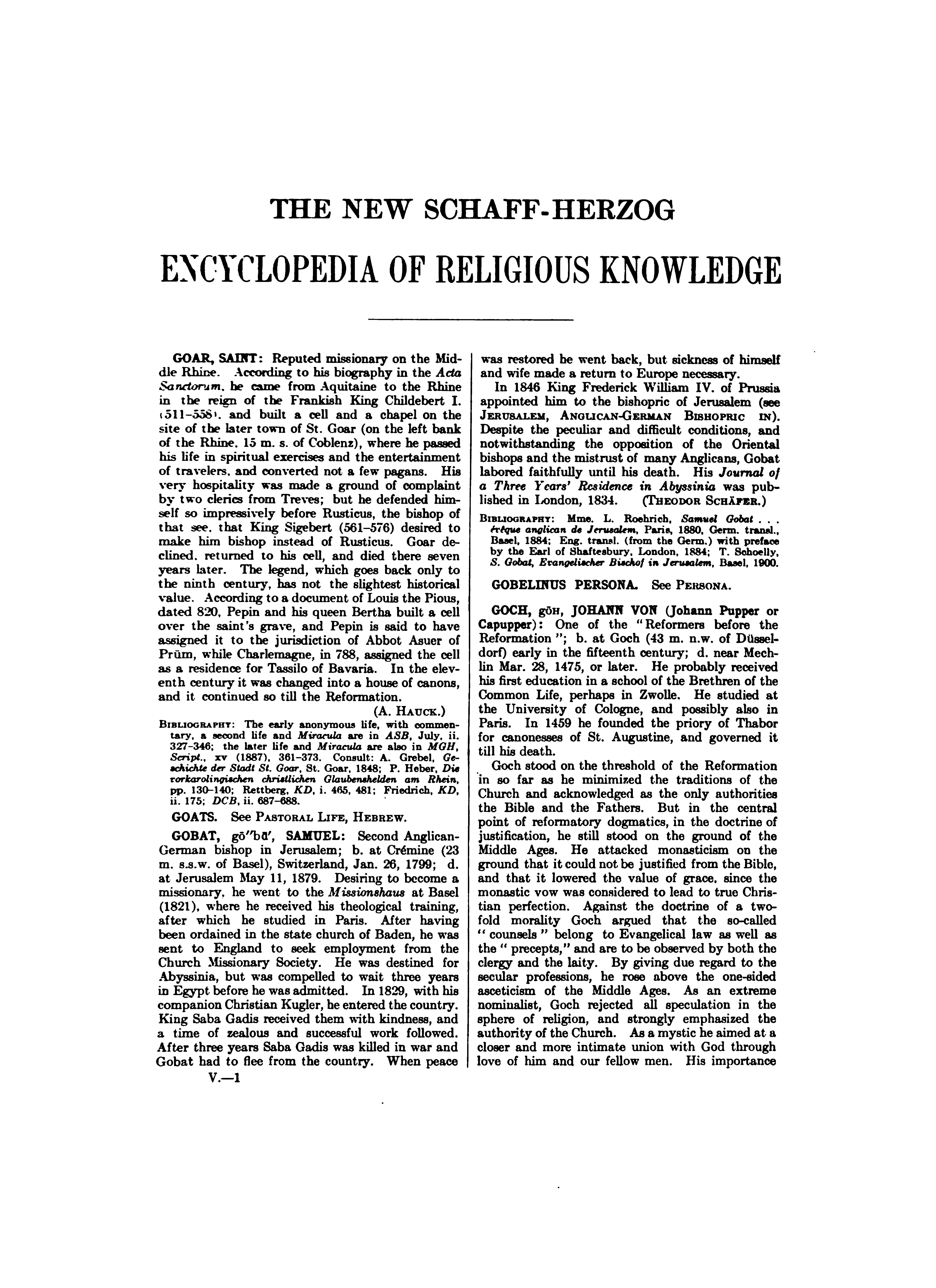THE
NEW
SCHAFF-HERZOG
ENCYCLOPEDIA
OF
RELIGIOUS
KNOWLEDGE
GOAR,
SAINT:
Reputed
missionary
on
the
Mid-
die
Rhine.
According
to
his
biography
in
the
Ada
Sanctorum,
be
came
from
Aquitaine
to
the
Rhine
in
the
reign
of
the
Frankish
King
Childebert
I.
(511-55St.
and
built
a
cell
and
a
chapel
on
the
site
of
the
later
town
of
St.
Goar
(on
the
left
bank
of
the
Rhine.
15
m.
s.
of
Coblenz),
where
he
passed
his
life
in
spiritual
exercises
and
the
entertainment
of
travelers,
and
converted
not
a
few
pagans.
His
very
hospitality
was
made
a
ground
of
complaint
by
two
clerics
from
Treves;
but
he
defended
him-
self
so
impressively
before
Rusticus,
the
bishop
of
that
see,
that
King
Sigebert
(561-576)
desired
to
make
him
bishop
instead
of
Rusticus.
Goar
de-
clined,
returned
to
his
cell,
and
died
there
seven
years
later.
The
legend,
which
goes
back
only
to
the
ninth
century,
has
not
the
slightest
historical
value.
According
to
a
dociunent
of
Louis
the
Pious,
dated
820,
Pepin
and
his
queen
Bertha
built
a
cell
over
the
saint's
gra\-e,
and
Pepin
is
said
to
have
assigned
it
to
the
jurisdiction
of
Abbot
Asuer
of
Prum,
while
Charlemagne,
in
788,
assigned
the
cell
Bs
a
residence
for
Tassilo
of
Bavaria.
In
the
elev-
enth
century
it
was
changed
into
a
house
of
canons,
and
it
continued
so
till
the
Reformation.
(A.
Hauck.)
Bibliographt:
The
early
anonymous
life,
with
oommen-
tary,
a
second
life
and
Miraeula
are
in
ASB,
July.
ii.
327-346;
the
later
life
and
Miraeula
are
also
in
MOH,
Script.,
XV
(1887).
361-373.
Consult:
A.
Grebel.
Ge-
•chidUe
der
Stadt
St.
Goar,
St.
Goar.
1848;
P.
Heber.
Die
Tcrkarolingiuhen
chriaUidien
Glaubenahelden
am
Rhein,
pp.
130-140;
Rfittberg,
KD,
i.
465,
481;
Friedrich,
KD,
ii.
175;
DCB,
ii.
687-688.
GOATS.
See
Pastoral
Life,
Hebrew.
GOBAT,
go"ba',
SAMUEL:
Second
Anglican-
German
bishop
in
Jerusalem;
b.
at
Cr^mine
(23
m.
8.S.W.
of
Basel),
Switzerland,
Jan.
26,
1799;
d.
at
Jerusalem
May
11,
1879.
Desiring
to
become
a
missionary,
he
went
to
the
Missionshaus
at
Basel
(1821),
where
he
received
his
theological
training,
after
which
he
studied
in
Paris.
After
having
been
ordained
in
the
state
church
of
Baden,
ho
was
sent
to
England
to
seek
employment
from
the
Church
Missionary
Society.
He
was
destined
for
Abyssinia,
but
was
compelled
to
wait
three
years
in
Egypt
before
he
was
admitted.
In
1829,
with
his
companion
Christian
Kugler,
he
entered
the
country.
King
Saba
Gadis
received
them
with
kindness,
and
a
time
of
zealous
and
successful
work
followed.
After
three
years
Saba
Gadis
was
killed
in
war
and
Gobat
had
to
flee
from
the
country.
When
peace
v.—
1
was
restored
he
went
back,
but
sickness
of
himself
and
wife
made
a
return
to
Europe
necessary.
In
1846
King
Frederick
WiUiam
IV.
of
Prussia
appointed
him
to
the
bishopric
of
Jerusalem
(see
Jerusalem,
Anoucan-German
Bishopric
in).
I>espite
the
peculiar
and
difficult
conditions,
and
notwithstanding
the
opposition
of
the
Oriental
bishops
and
the
mistrust
of
many
Anglicans,
Gobat
labored
faithfully
imtil
his
death.
His
Journal
of
a
Three
Years*
Residence
in
Abyssinia
was
pub-
lished
in
Ix)ndon,
1834.
(Theodor
SchAfbr.)
Bibuography:
Mme.
L.
Roehrich.
Samuel
Gobat
.
.
.
hrique
anolican
de
JerueaUm,
Paris,
1880,
Germ,
tranal.,
Basel.
1884;
Eng.
traiul.
(from
the
G«rm.)
with
preface
by
the
Earl
of
Shaftesbury.
London.
1884;
T.
Sohoelly,
S.
Gobat,
Evanoeliecher
Biackof
in
Jeruealem,
Basel,
1900.
GOBELmUS
PERSONA.
See
Persona.
GOCH,
gOH,
JOHAim
VON
(Johann
Pupper
or
Capupper):
One
of
the
''Reformers
before
the
Reformation
";
b.
at
Goch
(43
m.
n.w.
of
DUssel-
dorO
early
in
the
fifteenth
century;
d.
near
Mech-
lin
Mar.
28,
1475,
or
later.
He
probably
received
his
first
education
in
a
school
of
the
Brethren
of
the
Common
Life,
perhaps
in
Zwolle.
He
studied
at
the
University
of
Cologne,
and
possibly
also
in
Paris.
In
1459
he
founded
the
priory
of
Thabor
for
canonesses
of
St.
Augustine,
and
governed
it
till
his
death.
Goch
stood
on
the
threshold
of
the
Reformation
in
so
far
as
he
minimized
the
traditions
of
the
Church
and
acknowledged
as
the
only
authorities
the
Bible
and
the
Fathers.
But
in
the
central
point
of
reformatory
dogmatics,
in
the
doctrine
of
justification,
he
still
stood
on
the
ground
of
the
Middle
Ages.
He
attacked
monasticism
on
the
ground
that
it
could
not
be
justified
from
the
Bible,
and
that
it
lowered
the
value
of
grace,
since
the
monastic
vow
was
considered
to
lead
to
true
Chris-
tian
perfection.
Against
the
doctrine
of
a
two-
fold
morality
Goch
argued
that
the
so-called
**
coimsels
"
belong
to
Evangelical
law
as
well
as
the
"
precepts,"
and
are
to
be
observed
by
both
the
clergy
and
the
laity.
By
giving
due
regard
to
the
secular
professions,
he
rose
above
the
one-sided
asceticism
of
the
Middle
Ages.
As
an
extreme
nominalist,
Goch
rejected
all
speculation
in
the
sphere
of
religion,
and
strongly
emphasized
the
authority
of
the
Chureh.
As
a
mystic
he
aimed
at
a
closer
and
more
intimate
union
with
God
through
love
of
him
and
our
fellow
men.
His
importance

